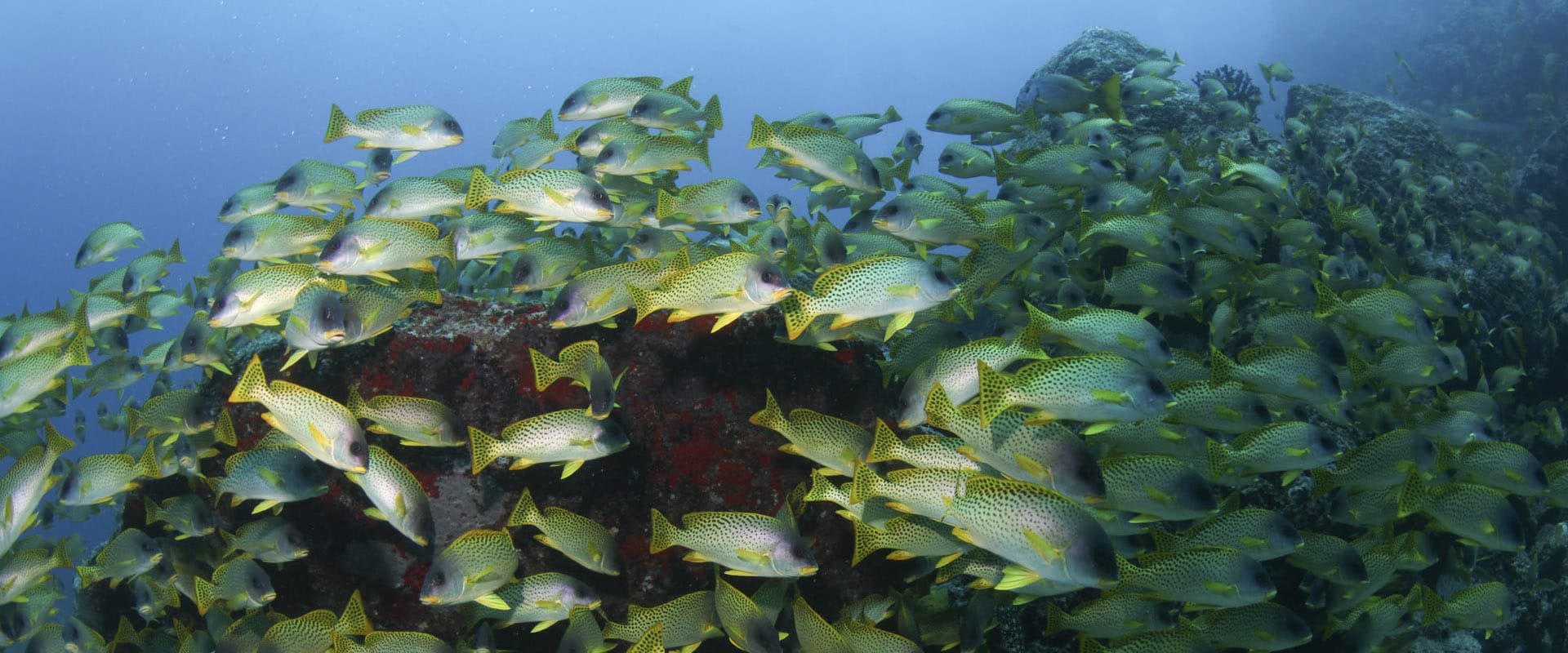Diving in Djibouti
The sheer number of species seen while scuba diving in Djibouti is staggering. This Red Sea destination offers divers a chance to catch a glimpse of pilot whales, manta rays and even tiger sharks in warm, clear waters. The Devil’s Cauldron at Goubet Al Kharab is renowned as a nursery for juvenile whale sharks.
Scuba diving in Djibouti will surprise a lot of divers with the sheer amount of diversity available in this little known area. It's a place that certainly doesn't roll straight off the tongue as a dive holiday destination for many westerners, yet diving in Djibouti is utterly breathtaking, and if the words 'The Red Sea' mean anything to you, you'll understand why. Little known, the Republic of Djibouti is located in the Horn of Africa, bordered by Eritrea, Somalia & Ethiopia, with the Red Sea to the North, Indian Ocean to the South and the Gulf of Aden on it's doorstep, it gives access to some of the world's most famous bodies of water and is sure to be an absolute mecca for scuba diving.
It's a place where every component of a great scuba diving experience comes together - crystal clear waters, reliable weather, excellent facilities and best of all some of the most diverse and healthy marine life on the planet. Egypt is the most thought of access point, however Djibouti is easy to reach, and is far less touristy, meaning that dive spots here are much quieter than its North African neighbour, allowing divers to explore the stunning underwater landscape in relative peace. Djibouti scuba diving is probably best known for the large numbers of the majestic Whale Sharks in its waters, which, in season, you are very likely to come across, especially if undertaking several dives per day, or over a few days.
1 Liveaboard in Djibouti
Explore all liveaboards
Elegante
Djibouti-
- from $ 194 / day
- 8.1 Very good
- 15reviews
Diving in Djibouti FAQ
What marine life can I expect to see in Djibouti?
Without doubt, many divers visiting Djibouti on a dive trip do so due to the high chance of seeing and swimming with the largest shark of them all - the Whale Shark. There's few places on Earth where you'll have a better chance of coming face to face with these gentle giants, which are not at all dangerous and despite their size can be fairly timid, and easily scared. Of particular interest in Djibouti are the high numbers of juvenile Whale Sharks, which have been able to thrive in the protected coastal waters around the country. Scuba diving in Djibouti is heavily geared towards the Whale Sharks, however they certainly aren't the only marine life on show. Dolphins often join dive boats on their way to dive sites, playfully swimming and jumping alongside, eager to socialise and make themselves known! As most divers will know, where there's dolphins, there's likely to be sharks, and there's no exception here where commonly Grey and Nurse Sharks are encountered, along with occasional Tiger and Blue sharks. Other large animals regularly seen include elegant Manta Rays, and several Pilot Whales.
The more well known sites of the Northern Red Sea sport similar coral species to those found here in the south, but of course the beauty of scuba diving in Djibouti waters is the undisturbed condition of them. Over 200 species exist, spread out over several fabulous dive spots, and supporting huge numbers of reef fish, including schools of Jacks, Snappers and Barracuda.
What are the best dive sites in Djibouti?
The Seven Brothers Islands are a chain of volcanic islands lying a few miles off the coast of Djibouti. Despite the name, there are actually six islands, although the presence of a volcanic hill amongst them has resulted in the 'seven' within their title. Each island is surrounded by wonderfully healthy coral reefs, with some of the best scuba diving in Djibouti and in a few people's opinion up there amongst the world's best. Common inhabitants are MantaRays and Whale Sharks, both of which can be seen throughout the year.
The abundance of plankton at Goubet Al Kharab, provides an ideal environment for Whale Sharks and Mantas, where divers are spoilt by the numbers of these graceful creatures. Also known as the 'Devil's Cauldron', this unique dive spot offers the chance of seeing juvenile Whale Sharks due to it's status as a nursery for these young animals. Goubet Al Kharab is a lovely bay, connected to another well known site, the Gulf of Tadjourah by a narrow body of water. It's possible to dive between 2 tectonic plates here, which for many will be a once in a lifetime opportunity.
The Gulf of Tadjourah is part of the Indian Ocean but is really the entrance to the Red Sea, the majority of which falls in Djibouti territory. The turquoise waters offer some of the best diving in Djibouti, with pleasant temperatures, excellent visibility, and incredibly diverse marine life. Whale Sharks are frequently seen, again being the main attraction, but the presence of an abundance of healthy corals all in great condition due to the relatively low tourist numbers ensure that each dive is packed full of dazzling and vibrant colours.
What's the best time to dive in Djibouti?
Due to the year round warm temperatures and favourable conditions, scuba diving in Djibouti is possible all the time. In most sites, Mantas and Whale Sharks can be seen throughout the year, although due to the plankton bloom, the best conditions for them are between September/October and February. Visibility is often in excess of 20 metres, with an average water temperature of between 26 and 30 degrees Celsius - very pleasant! Some people feel that the best time to visit Djibouti is in the cooler months of November through till April.
What's the recommended experience level for scuba diving in Djibouti?
Djibouti has a variety of sites for all experience levels. The vast majority are suitable for beginners, especially in the calm, protected bays. There are a couple of dive spots where more experience is required, and perhaps an Advanced qualification, due to strong currents in some areas around the Gulf of Tadjourah and the Seven Brothers. As always, if you aren't sure - ask your guide.
Depending on who you are diving with, there may be courses on offer. Some operators provide learning from beginner through to technical diving courses, allowing the keen diver to update and improve their skills.
How do I get to Djibouti?
Djibouti is a place that is a little off the beaten track but is slowly becoming more trodden, and so now may be the time to take the plunge (no pun intended!) and experience what this humble country has to offer.
Djibouti-Ambouli International Airport is conveniently close to Djibouti city, although most hotels or Djibouti liveaboard operators will offer to pick you up anyway. The airport has flights to and from a few European destinations, but it's more likely for visitors to transfer via Africa or the Middle East. Some liveaboard companies will even sort the flight from your home country, making things incredibly straight forward!
Dive trips often leave from the fishing port in Djibouti, again though many travel agents or operators will simply transfer you to the relevant departure point without having guests having to think about it.
1 Liveaboard in Djibouti
Explore all liveaboards
Elegante
Djibouti-
- from $ 194 / day
- 8.1 Very good
- 15reviews











